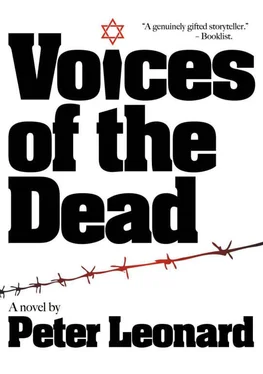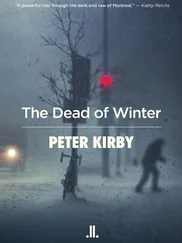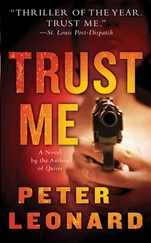It did, but an hour passed before Cordell was released. He didn’t say anything till they got in the car and were pulling out of the station parking lot.
“Didn’t mean to leave you there, Harry. But didn’t have a choice in the matter.” He opened his cigarette case, took one out and lit up. “Question is, how’d you know where I was at?”
“I didn’t,” Harry said. “When I came out and the car was gone, I figured you’d been kidnapped. There was no place else to go.”
“It was a mind fuck, Harry.”
“I hear you. Had one of my own.” He told him what happened, Cordell’s eyes on him, blowing smoke out the side of his mouth against the windshield, holding the cigarette with his thumb and index finger like a comrade from Minsk.
“You like livin’, Harry? ’Cause you want to continue, I suggest you get the fuck out of here.”
“I can’t.”
“You can’t, huh? Why’s that?”
“Something I have to take care of.”
The uniform was tight through the shoulders but fit good enough. The cap hid his face and he had shaven off the mustache and goatee to further disguise himself for the occasion. His daughter Katya had said, “Papa, you look so different, so much younger.” Hess carried a square box filled with newspapers to give it weight, plus a couple items he would need, the box wrapped in brown paper, an ordinary parcel delivered by an ordinary postman. Nothing to call attention to himself, or arouse suspicion in this quiet neighborhood.
The package was addressed to Wilhelm Martz, Kreuzstrasse 47. Hess rang the doorbell and waited. The door opened a few inches. A woman with dark hair and round glasses stood back in the shadows of the interior, eyeing him with suspicion, as if postmen were not to be trusted.
“Special delivery for Herr Martz.” He smiled like a friendly jovial uncle. “It looks important. Maybe filled with money, you never know.” He smiled again.
“Will you leave it there on the stoop, please?”
“Herr Martz himself must sign for the package. New postal regulations. Is he at home?”
“Please, wait there, I will tell him.” She closed the door, but not all the way.
Hess waited a few seconds, gave her time to move into the house, pushed the door open, slipped into the dark foyer. There were rooms on both sides. Straight ahead, down a short hallway was a staircase that led to the second floor. He didn’t see or hear anyone. Rausch had been watching the house and was sure only Herr Martz and his daughter were there.
He put the package down, leaned it against the wall in plain view, knowing it would confuse them. Now he pushed the door and heard it click as it closed and locked. He moved to his left out of the foyer into an elegantly furnished room with a view of the street. Hess sat on one of the comfortable upholstered chairs and waited. A few minutes later he heard them talking, coming toward him down the hall, he could feel his pulse quicken.
“What is it?” a man’s voice said. “I’m not expecting anything.”
“I don’t know. You have to sign for it.”
“That’s crazy. Anyone can sign for a package.”
“It’s what he told me.”
Hess saw them walk past him into the foyer, footsteps on the hardwood floor.
“That’s strange,” the daughter said. “It’s the package.”
“I thought I had to sign for it.”
This was perfect. They had no idea what was happening. Hess was grinning, enjoying their confusion. He almost laughed. He could hear Herr Martz shaking the box.
“What do you think it is?”
“I don’t know,” Herr Martz said.
“Why don’t you open it?”
They came into the room, the old man ripping the paper off it. Hess stood, drew his Luger, aimed it at them and said, “It’s just some old newspapers.”
“Ernst Hess,” the old man said, catching him by surprise.
“Have we met?”
“Not formally. But I remember you.”
“I am flattered,” Hess said.
“Don’t be. It isn’t a compliment.”
“You still think this is Nazi Germany? You can walk into our home?” the daughter said with considerable umbrage and hostility. “What do you want?”
Hess grinned. She was tough. If they had all been as tough as her exterminating them would have been a lot more difficult. But then, her generation had learned from the mistakes of their elders. “Where is Harry Levin?”
“How do we know?” the daughter said.
“But you know him.”
The old man said, “His parents were my friends before you murdered them.”
Hess wasn’t expecting that. “Why was he in the forest outside Dachau with a shovel? What was he looking for?”
“Why don’t you ask him?” the daughter said.
“I am asking you.”
“We have no idea what you are talking about,” Herr Martz said.
“Let me help you.” Hess took a black-and-white photo out of his shirt pocket and handed it to him. “Harry Levin drove here yesterday. You gave him a shovel.” He pointed with the barrel of the Luger.
The old man said, “He is doing this for me. Digging up lilacs in the forest to transplant in my garden.”
He was digging up something. The mass grave of Jews was in that general vicinity, but how would Harry Levin know about it unless he was there? Was this possible?
Hess took them down to the cellar, made them undress and kneel on the brick floor. He tied their hands behind their backs with the rope he had brought in the box. The daughter had a remarkable body, full breasts, and slender waist, round hips, a high backside. He could feel himself getting aroused. That was part of the pleasure. “Was Harry Levin at Dachau?” He would have been a teenager and there were not many that young.
The old man said, “I remember one day prisoners were packed in the back of trucks and taken somewhere. The trucks would return for more. Almost six hundred people disappeared that day. We were told they were being transferred to a sub-camp to work in the factory.”
Hess said, “Were Harry Levin and his parents on those trucks?”
“You didn’t kill everyone,” the daughter said. “You weren’t paying attention. That was your mistake. There are witnesses. Survivors. They came out of the grave and now they are coming after you.”
Hess walked up and placed the barrel tip of the Luger against the old man’s temple. “Tell me the names of these witnesses.” He said it looking at the daughter, eyes moving down to her beautiful breasts, making the old man’s life or death her responsibility.
It was 6:27 in the evening when Harry dropped Cordell off. Sorry he’d missed the 5:30 phone call with Joyce. But they could reschedule. He went back to his hotel and phoned Martz. No answer. He was probably out to dinner. Martz was seventy-six. He had some quirks. Liked to eat early. If he ate too late he couldn’t sleep. That seemed reasonable. Harry showered, dressed and tried him again. Still gone. He called Colette and told her he had to stop by and see Martz. He’d be over as soon as he could.
Harry took the elevator down, went to the bar and ordered a Dewar’s and soda, nursed it and tried Martz again at 7:45, let it ring a dozen times. Nothing. Now Harry was concerned. According to Martz, he was a creature of habit. Got up at the same time every day. Had his meals at the same time. Went to bed at the same time.
Harry paid for the drink and took a taxi to Martz’ house on Kreuzstrasse. The house was dark, but as he walked to the front door he could see a light on in the salon. He rang the bell. No one came. He heard the phone ring inside. No one answered it. Harry walked around the house, through the garden to the back door. Looked at his watch. It was 8:10. Again, his gut told him something wasn’t right. Martz had a weak heart. Maybe he’d had a heart attack.
Читать дальше












